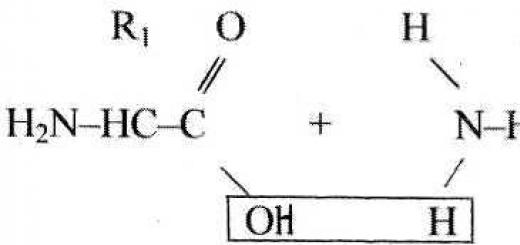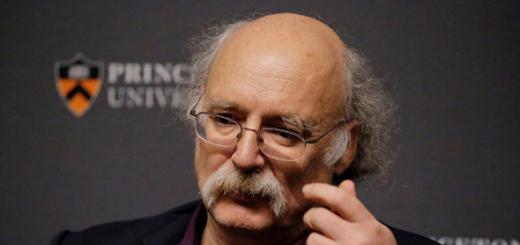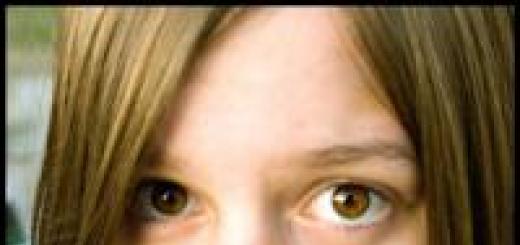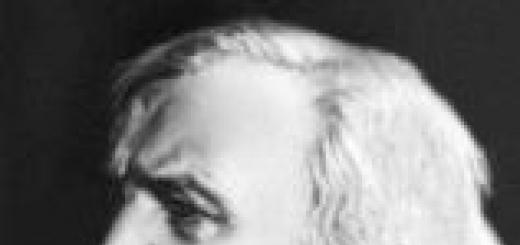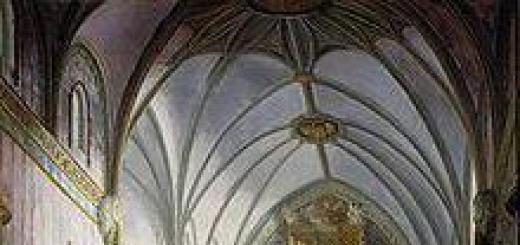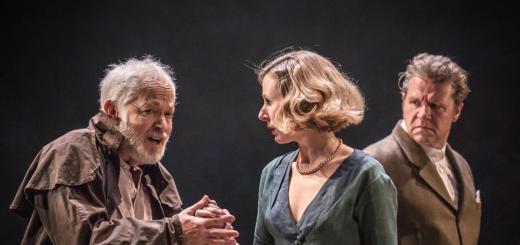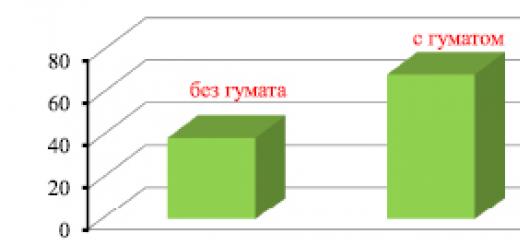On Thursday, October 13, the Nobel Committee awarded the Prize for Literature. Laureate "for creating new poetic expressions within the great American song tradition."
Nobel week began on October 3. This year, 11 people will receive awards in six categories. The awards ceremony will take place in December. Nobel Prize laureates are in the RBC photo gallery.
Nobel Prize in Medicine - Yoshinori Ohsumi
Professor of the Tokyo Institute of Technology Yoshinori Ohsumi received - the mechanism of degradation, or self-eating, and recycling of cells. The phenomenon of autophagy was first discovered in the 1960s. Scientists have noticed that cells can destroy their own contents by enclosing them in some kind of bags behind membranes where they are disposed of. It was Ohsumi who made crucial contributions to understanding this process through a series of experiments in the 1990s. To do this, he first studied and described autophagy in baker's yeast, and then proved that a similar process occurs in human cells.
Osumi was born in 1945 in the Japanese city of Fukuoka. He graduated from the University of Tokyo in 1974, then studied in New York for several years, after which he returned to Japan, where he teaches at the Tokyo Institute of Technology.

Nobel Prize in Physics - Duncan Haldane
Duncan Haldane was born in 1951 in Great Britain. He teaches at the Faculty of Physics at Princeton University in the USA, and is a member of the Royal Society of London and the American Academy of Arts and Sciences.

Photo: Jeroen Van Kooten/University of Groningen via AP
Nobel Prize in Chemistry* - Bernard Feringa (Netherlands)
Bernard Feringa, Jean-Pierre Sauvage and James Fraser Stoddart. Scientists have managed to use the smallest molecules like construction parts and create miniature devices from them.
Feringa is vice-president of the Royal Netherlands Academy of Sciences and a foreign member of the American Academy of Arts and Sciences. He was born in 1951 in Barger-Compascoum. Works in the field of stereochemistry, homogeneous catalysis and molecular nanotechnology.
*as part of a group of scientists

Nobel Prize in Chemistry - James Fraser Stoddart (USA)
James Fraser Stoddart is a member of the US National Academy of Sciences, the American Academy of Arts and Sciences, and the Royal Society of London. He was born in 1942 in Edinburgh, works at Northwestern University (Chicago, USA), a specialist in the field of supramolecular chemistry and nanotechnology.

Peace Prize - Colombian President Juan Manuel Santos
Juan Manuel Santos received the award. On September 26, he managed to sign a ceasefire agreement with the FARC group. This should put an end to the civil war, which has officially lasted since 1964. As of 2012, 218 thousand people became its victims.

Nobel Prize in Economics - Bengt Holmström
Bengt Holmström and Oliver Hart won the prize in economics "for their contributions to contract theory." that occur in real life. Their research has informed the development of policies and institutions in many areas, including bankruptcy law and political constitutions.
Bengt Holmström was born in 1949 in Finland. Studied at the University of Helsinki and Stanford. Since 1978, he taught at the Swedish School of Economics and Business Administration, and from 1980-1983 at the Kellogg School of Management at Northwestern University. For some time he was a professor at Yale University. Since 1994 he has been working at the Massachusetts Institute of Technology in the USA.

Nobel Prize in Housekeeping - Oliver Hart
Oliver Hart was born in England in 1948. He graduated from King's College, Cambridge University, the University of Warwick and Princeton University, after which he worked for several years at Churchill College, Cambridge University, and then at the London School of Economics. In 1984 he moved to the USA, where he began working at the Massachusetts Institute of Technology, and then at Harvard, where he headed the economics department.

Nobel Prize for Literature - Bob Dylan
Bob Dylan, one of the most famous and award-winning musicians in the world.
In 2008, Dylan won the Pulitzer Prize "for his extraordinary influence on popular music and American culture, marked by lyrical compositions of exceptional poetic power."
Dylan was born in the USA in 1941 and became popular in the mid-60s. He is a multiple Grammy winner, a member of the Rock and Roll Hall of Fame, and in 2001 received an Oscar for the song “Things Have Changed” he wrote for the film “Geeks.”
On October 3, 2016, Nobel Week started in Sweden. From October 3 to October 10, the world will learn the names of people who have become Nobel laureates in various fields. And the award ceremony will be held in Stockholm and Oslo on December 10 - the day of the death of Alfred Nobel - the Swedish inventor, industrialist, linguist and philosopher. The amount of the Nobel Prize in 2016 is 8 million Swedish kronor (932 thousand US dollars).
When will the names of the Nobel Prize laureates be announced?
Today in Stockholm the name of the 2016 Nobel Prize laureate in the field of physiology or medicine became known. It was the Japanese biologist Yoshinori Ohsumi. He will receive the award for discovering the mechanism of autophagy, the process of recycling unnecessary cell parts inside lysosomes or vacuoles.
On Friday, October 7, the Nobel Peace Prize laureate will be named in Oslo. It is known that this year there are 376 candidates on the list of nominees, of which 148 are public and international organizations.
The winner of the Nobel Prize in Economics, established by the State Bank of Sweden in 1968, will be determined on October 10. This prize appeared in memory of Alfred Nobel, who at the end of the 19th century bequeathed only five awards.
As for another nomination - for literature, the Swedish Academy responsible for this decided to name the laureate a week later than usual, that is, on October 13. The pundits explained their decision by tradition, according to which the announcement of the laureate’s name should always fall on the Thursday of the fourth week of the academicians’ meeting. In 2016, this day fell on October 13 and did not coincide with the week of presentation of other Nobel laureates.
Nobel Prize: how to get it, history of the award
During his lifetime, Alfred Nobel (1833-1896) earned substantial capital in the production of weapons (his most famous invention, by the way, is dynamite). He bequeathed every year to divide the income from the capital placed in the Swedish bank (about 250 million US dollars) among people who have made a worthy contribution in a particular area. Nobel identified 5 areas: physics, chemistry, physiology (or medicine), literature and contribution to achieving peace. The amount of the Nobel Prize is decreasing every year. If in the early 2000s it was about 1.5 million dollars, then in 2014 it was already 1 million, and in 2015 – 960 thousand dollars.
All preparatory work - from the selection of applicants to the holding of the ceremony - is carried out by the Nobel Foundation. The right to select laureates is given to Swedish institutions, and the peace prize laureate is chosen by the Norwegian Nobel Committee.
Nobel Prize winners are selected based on basically the same principle: the number of publications in each field, the significance of the research, reviews of work in academia, etc. This is indeed a very difficult job for members of the Nobel committees (they include winners of previous years), since they have to choose one worthy one from 300 candidates.
Mikhail Gorbachev - Nobel Peace Prize laureate in 1990
By the way, the list of candidates is strictly secret and can only be made public after 50 years from the date of its compilation.
When and where are Nobel laureates awarded?
After the winner of the Literature Prize is announced on October 13, preparations for the Nobel Prize ceremony will begin in Sweden and Norway. The ceremony itself always takes place on the same day - December 10 and is dedicated to the day of the death of Alfred Nobel. On December 10, 2016, in the morning in Oslo, the Peace Prize will be awarded at the Oslo City Hall. And in the evening of this day in Stockholm the awarding of laureates in physics, chemistry, medicine, literature and economics will take place. The day will end with a gala banquet at Stockholm City Hall, which traditionally will bring together more than 1,300 guests and is always attended by the King of Sweden and members of the royal family.
Russians are Nobel Prize winners
During the entire existence of the Nobel Prize, citizens of the USSR and the Russian Federation received it only 26 times. Such an insignificant figure is explained by two main reasons: the country’s closed nature for 70 years and the high politicization of the Nobel Prize.
1904 - Ivan Pavlov (medicine)
1908 - Ilya Mechnikov (medicine)
1933 – Ivan Bunin (literature)
1956 - Nikolay Semenov (chemistry)
1958 - Pavel Cherenkov, Ilya Frank and Igor Tamm (physics)
1958 - Boris Pasternak (literature), refused the award
1962 - Lev Landau (physics)
1964 – Nikolai Basov and Alexander Prokhorov (physics)
1965 - Mikhail Sholokhov (literature)
1970 - Alexander Solzhenitsyn
1971 - Simon Kuznets (economics)
1973 - Vasily Leontyev (economics)
1975 - Leonid Kantorovich (economics)
1975 – Andrei Sakharov (peace prize)
1977 - Ilya Prigozhin (chemistry)
1978 - Petr Kapitsa (physics)
1987 - Joseph Brodsky
1990 - Mikhail Gorbachev (peace prize)
2000 - Zhores Alferov (physics)
2003 - Alexey Abrikosov and Vitaly Ginzburg (physics)
2010 - Konstantin Novoselov and Andrey Geim (physics).
In 2016, Nobel Week opened on October 3. By tradition, the laureates were named in six categories: for merits in the field of physics, chemistry, medicine, literature, economics, as well as for achieving success in the struggle for peace.
The award will be presented on December 10 at the Stockholm Philharmonic, the day of Alfred Nobel's death. The laureates will receive a gold medal with a portrait of the founder of the award, a diploma and a cash reward in the amount of 8 million crowns ($932 thousand).
All the winners and their discoveries are in the TASS material.
Physics
- The Nobel Prize in Physics was awarded to American scientists David Thoules, Michael Kosterlitz and Duncan Haldane "for their theoretical discoveries of topological phase transitions and topological phases of matter." Scientists have discovered unexpected behavior in solid materials and used advanced mathematics to explain states unusual in matter - superconductivity and superfluidity. The scientists' discoveries can be applied in electronics, in particular, in the creation of superconductors and quantum computers.
Physiology and medicine
- In the field of medicine, the prize was awarded to Japanese professor Yoshinori Ohsumi for the discovery of the mechanism of autophagy - the natural process of “self-cleaning” of the cell of living organisms, that is, the destruction and recycling of its internal components. Autophagy plays an important role in various physiological processes: it can destroy bacteria and viruses that have entered the cell, promotes the development of the embryo, cells also use this mechanism to eliminate damaged proteins and organelles, which is important for counteracting aging. Mutations in genes that control autophagy can cause diseases such as Parkinson's disease and cancer.
Chemistry
- Frenchman Jean-Pierre Sauvage, Briton working in the United States, Fraser Stoddart and Dutch scientist Bernard Feringa won the chemistry prize "for the design and synthesis of molecular machines." Scientists have created molecules whose movement can be controlled. With their help, you can manipulate single atoms and molecules, for example, transfer them from one place to another, bring them closer to form a chemical bond, or move them away from each other to break it. The discovery can be used to improve the effectiveness of treatment of various diseases, such as cancer. With the help of such molecules, scientists hope to develop ways to target disease sites without harming healthy parts of the body.
Economy
- Oliver Hart and Bengt Holmström were awarded the Nobel Prize in Economics. Economists have created new theoretical tools in the field of real assessment of contracts between participants in business processes, allowing them to identify the pitfalls of contracts. Contract theory develops the topic of managing a company under the possibility of conditions of information asymmetry. We are talking about a phenomenon present in the business environment when the management of an enterprise, investors, as well as direct performers have different awareness of the market situation and the risks that the company bears. The research of Hart and Holmström is important for various fields, in particular economics, law, and government.
Peace Prize
- This year there were a record 376 nominations for the peace prize. On October 7, the Nobel committee awarded it to Colombian President Juan Manuel Santos "for his determined efforts to end more than 50 years of civil war in the country." Armed conflict between the authorities and the rebels began in the 1960s. And only in 2016 the parties managed to reach a final agreement on its completion. During this time, 220 thousand Colombians died, almost 6 million people fled their homes.
Literature
- The name of the laureate in the field of literature was the main surprise of this year. The award was given to poet and performer Bob Dylan "for creating poetic images in the great American song tradition." He became the first musician to be awarded the Nobel Prize in its history. Dylan is the author of the songs "The Times They Are a-Changin'", "Blowin" in the Wind, Like a Rolling Stone, and recorded the albums "The Freewheelin" Bob Dylan, Highway 61 Revisited and others. In his country, Bob Dylan is popular not only as a musician, but also as a poet and prose writer.
The 2016 Nobel Prize ceremony took place in Sweden. Nine of the eleven laureates received honorary diplomas and gold medals at the Stockholm Philharmonic from the hands of King Carl XVI Gustaf of Sweden. On-line translation The ceremony was held on the official award channel on YouTube.
The first Nobel Peace Prize was awarded. This year it was received by Colombian President Juan Manuel Santos. According to the last will of the famous Swedish chemist Alfred Nobel, the Peace Prize, unlike other awards bearing his name, is awarded and awarded in Oslo, and not Stockholm, reminds TASS.
The head of Colombia received the award for his "decisive efforts to end more than 50 years of civil war in the country." Since 1964, the conflict has killed 220,000 Colombians and forced 6 million to flee their homes.
In his Nobel speech, Juan Manuel Santos said the prize would give his country's "unthinkable dream" of peace a new impetus. “As a result of this agreement (between the Colombian authorities and the militants of the Revolutionary Armed Forces. - Ed.), we can say that the American continent - from Alaska to Patagonia - has become a land of peace,” Santos said (quoted by Interfax).
The President added that achieving peace in Colombia after half a century of bloody civil conflict is part of the dream that the outstanding Colombian writer Gabriel García Márquez spoke about in his Nobel lecture in 1982.
— The Nobel Prize (@NobelPrize) December 10, 2016— The Nobel Prize (@NobelPrize)On Saturday, December 10, a ceremony was held at the Stockholm Concert Hall to award Nobel Prizes for achievements in the fields of physiology and medicine, physics, chemistry and economics. Nine laureates received medals and diplomas in recognition of their merits from the hands of the King of Sweden, Carl XVI Gustaf.
Context
Winner of the Nobel Prize in Literature, American musician and poet Bob Dylan, whose candidacy was the subject of the most heated controversy, did not come to the presentation, explaining this decision by “previously assumed obligations.” Dylan became the first musician in history to be awarded the Nobel Prize for Literature.
A Hard Rain's a-Gonna Fal l
Despite the absence of the US laureate in Stockholm, the song A Hard Rain's a-Gonna Fall, written by him in 1962, was performed at the gala event. The composition, presented in an arrangement by the Swedish composer Hans Eck and the Royal Stockholm Philharmonic Orchestra, was performed by the American singer and poet Patti Smith. In the middle, apparently out of excitement, she lost her way, for which she apologized to the audience, after which she continued her performance. Despite the hesitation, the audience rewarded the “godmother of punk rock” with prolonged applause.
The Nobel Committee clarified that the medal and diploma will be awarded to Dylan at a later date, as soon as “a suitable opportunity presents itself.” The musician sent the text of a speech to the Nobel Foundation, in which he thanked for awarding him the high award. The speech itself will be read later at the banquet.
Nine laureates
Among the laureates who took the stage at the concert hall in Stockholm on Saturday, December 10, was Tokyo University professor Yoshinori Ohsumi, who received an award in the field of physiology and medicine “for his discovery of the mechanisms of autophagy.” This is the name of one of the cell’s self-regulation mechanisms, which ensures the release of enzymes that destroy intracellular structures.
David Thouless, Duncan Haldane, and Michael Kosterlitz were recognized for their achievements in the field of physics, having made “theoretical discoveries of topological phase transitions and topological phases of matter.” Their research helped to better understand the state of superconductivity and superfluidity.
Chemists Jean-Pierre Sauvage, James Fraser Stoddart and Bernard Feringa received the award for the design and synthesis of molecular machines.
The 2016 Nobel Prize in Economics was awarded to Oliver Hart and Bengt Holmström for their contributions to the theory of contracts.
The cash equivalent of the award was 8 million Swedish kronor (about 830 thousand euros). The awards ceremony traditionally takes place on December 10, the day of the death of the prize's founder, Alfred Nobel.
see also:
-
Creator of fertilizers and chemical weapons
One of the most controversial Nobel Prize winners was Fritz Haber. The Chemistry Prize was awarded to him in 1918 for his invention of a method for the synthesis of ammonia, a discovery of crucial importance for the production of fertilizers. However, he is also known as the "father of chemical weapons" due to his work on the poisonous gas chlorine used during the First World War.

From Friedman to Obama: The most controversial Nobel laureates
Deadly discovery
Another German scientist, Otto Han (pictured center), was awarded a Nobel Prize in 1945 for his discovery of nuclear fission. Although he never worked on the military application of this discovery, it led directly to the development of nuclear weapons. Gan received the prize several months after nuclear bombs were dropped on Hiroshima and Nagasaki.

From Friedman to Obama: The most controversial Nobel laureates
A breakthrough that was banned
Swiss chemist Paul Müller won a medical prize in 1948 for his discovery that DDT could effectively kill insects that spread diseases such as malaria. The use of pesticides once saved millions of lives. However, later environmentalists began to argue that DDT poses a threat to human health and harms nature. Today its use is prohibited throughout the world.

From Friedman to Obama: The most controversial Nobel laureates
Inconvenient Reward
Because of its overt and implied political overtones, the Peace Prize is perhaps the most controversial of all the Nobel awards. In 1935, German pacifist Carl von Ossietzky received it for exposing Germany's secret rearmament. Ossietzky himself was in prison on charges of treason, and an outraged Hitler accused the committee of interfering in Germany's internal affairs.

From Friedman to Obama: The most controversial Nobel laureates
(Possible) Peace Prize
The Norwegian committee's decision to award the Peace Prize to US Secretary of State Henry Kissinger and North Vietnamese leader Le Duc Tho in 1973 faced harsh criticism. The Nobel Prize was supposed to be a symbol of recognition of achievements in achieving a ceasefire during the Vietnam War, but Le Duc Tho refused to receive it. The Vietnam War continued for two more years.

From Friedman to Obama: The most controversial Nobel laureates
Libertarian and dictator
Free market advocate Milton Friedman is one of the most controversial recipients of the Nobel Peace Prize in economics. The committee's decision in 1976 sparked international protests because of Friedman's ties to Chilean dictator Augusto Pinochet. Friedman actually visited Chile a year earlier, and critics claim his ideas inspired a regime where thousands were tortured and killed.

From Friedman to Obama: The most controversial Nobel laureates
Vain hopes
The Peace Prize, which was shared in 1994 by Palestinian leader Yasser Arafat, Israeli Prime Minister Yitzhak Rabin and Israeli Foreign Minister Shimon Peres, was supposed to serve as an additional incentive for a peaceful resolution of the conflict in the Middle East. Instead, further negotiations failed, and Rabin was assassinated by an Israeli nationalist a year later.

From Friedman to Obama: The most controversial Nobel laureates
Creepy memoirs
Human rights activist Rigoberta Menchú, who defends the interests of the Mayan people, received the Peace Prize in 1992 “for her struggle for social justice.” Subsequently, this decision caused a lot of controversy, as falsifications were allegedly discovered in her memoirs. Her depictions of the atrocities of the genocide of Guatemala's indigenous people made her famous. However, many are convinced that she deserved the award anyway.

From Friedman to Obama: The most controversial Nobel laureates
Premature reward
When Barack Obama was awarded the Peace Prize in 2009, many were surprised, including himself. Having been president for less than a year at the time, he received the award for his “tremendous efforts to strengthen international diplomacy.” Obama's critics and some supporters felt the award was premature and he received it before he had a chance to make any real moves.

From Friedman to Obama: The most controversial Nobel laureates
Posthumous award
In 2011, the Nobel Committee named Jules Hoffman, Bruce Beutler and Ralph Steinman laureates in medicine for their discoveries in the study of the immune system. The problem was that Steinman had died of cancer a few days earlier. According to the rules, the prize is not awarded posthumously. But the committee still awarded it to Steinman, justifying it by the fact that his death was not yet known at that time.

From Friedman to Obama: The most controversial Nobel laureates
"The Greatest Omission"
The Nobel Prize is controversial not only because of who was awarded it, but also because someone never received it. In 2006, Nobel Committee member Geir Lundestad said that "it is undoubtedly the greatest omission in our 106-year history that Mahatma Gandhi never received the Nobel Peace Prize."
